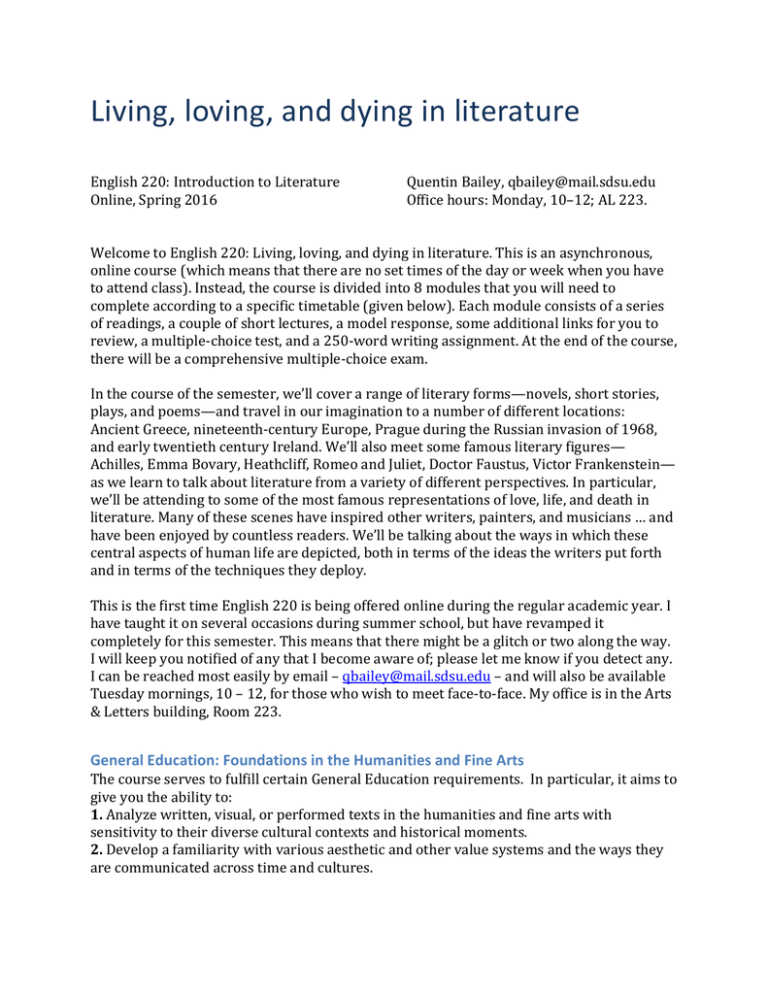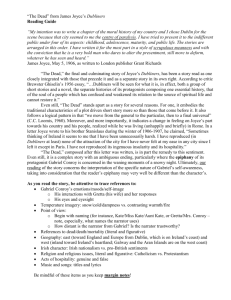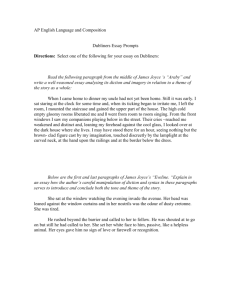Living, loving, and dying in literature
advertisement

Living, loving, and dying in literature English 220: Introduction to Literature Online, Spring 2016 Quentin Bailey, qbailey@mail.sdsu.edu Office hours: Monday, 10–12; AL 223. Welcome to English 220: Living, loving, and dying in literature. This is an asynchronous, online course (which means that there are no set times of the day or week when you have to attend class). Instead, the course is divided into 8 modules that you will need to complete according to a specific timetable (given below). Each module consists of a series of readings, a couple of short lectures, a model response, some additional links for you to review, a multiple-choice test, and a 250-word writing assignment. At the end of the course, there will be a comprehensive multiple-choice exam. In the course of the semester, we’ll cover a range of literary forms—novels, short stories, plays, and poems—and travel in our imagination to a number of different locations: Ancient Greece, nineteenth-century Europe, Prague during the Russian invasion of 1968, and early twentieth century Ireland. We’ll also meet some famous literary figures— Achilles, Emma Bovary, Heathcliff, Romeo and Juliet, Doctor Faustus, Victor Frankenstein— as we learn to talk about literature from a variety of different perspectives. In particular, we’ll be attending to some of the most famous representations of love, life, and death in literature. Many of these scenes have inspired other writers, painters, and musicians … and have been enjoyed by countless readers. We’ll be talking about the ways in which these central aspects of human life are depicted, both in terms of the ideas the writers put forth and in terms of the techniques they deploy. This is the first time English 220 is being offered online during the regular academic year. I have taught it on several occasions during summer school, but have revamped it completely for this semester. This means that there might be a glitch or two along the way. I will keep you notified of any that I become aware of; please let me know if you detect any. I can be reached most easily by email – qbailey@mail.sdsu.edu – and will also be available Tuesday mornings, 10 – 12, for those who wish to meet face-to-face. My office is in the Arts & Letters building, Room 223. General Education: Foundations in the Humanities and Fine Arts The course serves to fulfill certain General Education requirements. In particular, it aims to give you the ability to: 1. Analyze written, visual, or performed texts in the humanities and fine arts with sensitivity to their diverse cultural contexts and historical moments. 2. Develop a familiarity with various aesthetic and other value systems and the ways they are communicated across time and cultures. 3. Argue from multiple perspectives about issues in the humanities that have personal and global relevance. 4. Demonstrate the ability to approach complex problems and ask complex questions drawing upon knowledge of the humanities. Are you ready for this course? 1. Have you completed English 100, RWS 100 or 101, Chicana or Chicano Studies 111B, American Indian Studies 120, Linguistics 100, OR General Studies 260A with a grade of “C” or better? 2. Have you completed the readiness survey at https://sunspot.sdsu.edu/pls/webapp/survey.hybrid_learning.main 3. You might also like to make sure that your computer has the following basic software: Adobe’s Acrobat Reader and Flash Player, QuickTime Player, and Microsoft Word Viewer (if you do not already have Word installed). 4. Are you prepared to work in a self-disciplined and self-motivated fashion? The course is designed to give you some flexibility within individual modules, but you need to take responsibility for completing all the work for each module within the specified time frame. Required texts (available at the university bookstore): 1. Mary Shelley, Frankenstein, 3rd ed. Norton 2. James Joyce, Dubliners, Dover Thrift Editions 3. Milan Kundera, The Unbearable Lightness of Being Additional readings for each module will be posted on the relevant Blackboard page. Assessment: The course consists of 8 discrete modules and a comprehensive final. In each module you are required to complete a multiple-choice test and a 250-word writing assignment. These tests and assignments are due by 11.55 pm on the day specified in the course outline. 8 tests (5% each): 8 writing assignments (5% each): Comprehensive multiple-choice final: 40% 40% 20% Please note: the final examination will be held Thursday 5 May. You will need to set aside 1 hour between 9 am and 9 pm in which to complete the exam. Course Outline: The following outline provides details of readings and due dates for completion of each module. Information about additional material (sample discussion papers, film and music clips) is available in the “Checklist” for each module, which sets out the work you should complete BEFORE taking the test and submitting the writing assignment. You are welcome to complete modules ahead of the deadline; late work will not be accepted. Please check your email regularly for announcements of any changes to the course. Module Primary Readings Due date 1. Young Love Christopher Marlowe, “The Passionate Shepherd to his love” & Sir Walter Ralegh, “The Nymph’s Reply” [Bb] Shakespeare, “Prologue” & “First kiss,” Romeo and Juliet, Act 1. Scene 5 [Bb] Emily Bronte, “I am Heathcliff,” from Wuthering Heights, chapter 9. [Bb] Virginia Woolf, “Clarissa’s memories of Sally Seton,” from Mrs. Dalloway [Bb] Joyce, “Araby,” from Dubliners Friday 29 January 2. Classic love Sappho, “Some Say” [Bb] Shakespeare, Sonnets 16, 18, 116, 130 [Bb] John Donne, “The Good Morrow” Jane Austen, “Knightley’s Declaration,” from Emma and “Darcy’s second declaration,” from Pride and Prejudice [Bb] Elizabeth Barrett Browning, “How do I love thee” & Robert Browning, “My Last Duchess” [Bb] Lord Byron, “She walks in beauty” [Bb] Wednesday 10 February 3. Love, life, and family Lord Byron, “Prometheus” [Bb] Percy Shelley, “Opening speech” from Prometheus Unbound [Bb] Mary Shelley, Frankenstein James Joyce, “The Sisters,” “An Encounter,” “Counterparts,” “A Little Cloud,” from Dubliners Wednesday 24 February 4. The lives of others William Wordsworth, “The Thorn,” “The Mad Mother,” “The Two Thieves,” “Beggars” [All Bb] Samuel Taylor Coleridge, “The Rime of the Ancient Mariner” Charles Baudelaire, “The Seven Old Men,” “Let’s beat up the poor!” [Bb] Katherine Mansfield, “The Garden Party” [Bb] James Joyce, “Grace” from Dubliners Wednesday 9 March 5. Sex and desire Milan Kundera, The Unbearable Lightness of Being Christopher Marlowe, “Helen of Troy,” from Doctor Faustus [Bb] D. H. Lawrence, “The White Stocking” [Bb] Phillip Larkin, “High Windows” & “Annus Mirabilis” [Bb] Katherine Mansfield, “Daughters of the Late Colonel” [Bb] Wednesday 23 March 6. Forbidden loves Christina Rossetti, “Goblin Market” [Bb] James Joyce, “A Painful Case,” from Dubliners W.H. Auden, “Lullaby,” “Musee des Beaux Arts,” “Stop all the clocks” [all Bb] D.H. Lawrence, “The Prussian Officer” [Bb] Katherine Mansfield, “Bliss” [Bb] E.M. Foster, from Maurice [Bb] Friday 8 April 7. War Death Homer, from The Iliad, part 22 [Bb] Alfred, Lord Tennyson, “The Charge of the Light Brigade” [Bb] Sir Henry Newbolt, “Vitai Lampada” [Bb] Thomas Hardy, “Drummer Hodge” [Bb] Rupert Brooke, “The Soldier” [Bb] Siegfried Sasson, “They” [Bb] Jessie Pope, “War Girls” [Bb] Wilfred Owen, “Dulce et Decorum Est” & “Anthem for Doomed Youth” [Bb] Friday 22 April 8. Love and death Shakespeare, “Death of Romeo and Juliet,” from Romeo and Juliet [Bb] Wordsworth, “Strange fits of passion,” “She dwelt among the untrodden ways,” & “A slumber did my spirit seal” [Bb] Edmond Rostand, from Cyrano de Bergerac Emily Bronte, “The death of Heathcliff,” from Wutheirng Heights [Bb] James Joyce, “Clay” & “The Dead” from Dubliners D.H. Lawrence, “Odour of Chrysanthemums” [Bb] Phillip Larkin, “Aubade” [Bb] Stevie Smith, “The Person from Porlock” [Bb] Wednesday 4 May Accommodations: Students who need accommodation of their disabilities should contact me privately to discuss specific accommodations for which they have received authorization. If you have a disability, but have not contacted Student Disability Services at 619-594-6473 (Calpulli Center, Suite 3101), please do so before making an appointment to see me. The web site for Student Disability Services is: http://www.sa.sdsu.edu/sds/index.html Academic Integrity: Do not present other people’s work or ideas as your own. Always provide clear reference details when you cite other people’s work. This includes not only directly cited work, but also paraphrases of other people’s ideas. Remember: the skillful presentation of research improves a piece of writing; citing your sources is part of this process. All writing assignments for this class will be submitted via Turnitin, which checks for instances of academic dishonesty. As mandated by CSU policy, all incidents of academic dishonesty in this class will be reported to the Center for Student Rights and Responsibilities. For further details of this process, please see http://csrr.sdsu.edu/academics1.html. A Note on Technology: Please be assured that if and when problems occur on the SDSU end, you will not be penalized. However, when problems occur on your end, the story is different: You are responsible for your computing needs. When problems occur on your end, you must fix them. I am an English professor and cannot provide IT support . IT problems that you experience do not constitute an acceptable excuse for non-completion of work. A Note on Grades: I make every effort to assess your work as fairly as possible and to provide you, through the Blackboard grade center, with details of your performance. But—unlike some other classes—literature is not about facts and figures. That is its beauty. Instead, it is about judgment, taste, and scholarly standards. If you have any questions about your grade, please let me know. I am happy to review your work and explain the reasons for my assessment.

